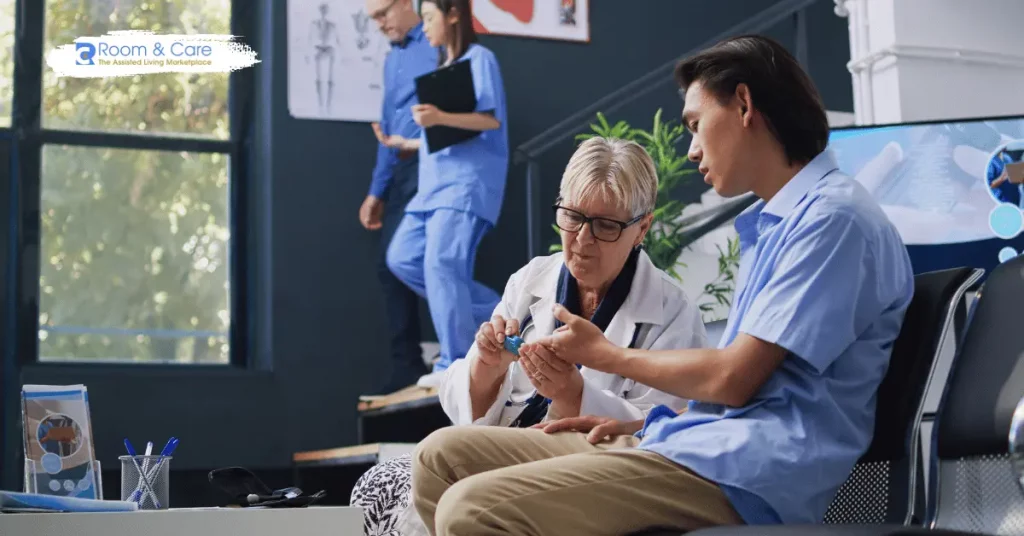

Senior citizen rehabilitation centers offer essential services to help older adults regain independence, improve health, and transition smoothly after illness, injury, or surgery. For families navigating care options, rehabilitation centers provide tailored recovery programs that address physical, mental, and emotional well-being, creating a supportive environment for seniors to thrive. This guide explores everything you need to know about choosing the right senior citizen rehabilitation center, with insights into related options like nursing homes and memory care facilities, ensuring you have a comprehensive understanding of the choices available.
Senior rehabilitation centers specialize in short-term recovery and long-term therapy for older adults facing various health challenges. These centers support seniors recovering from surgery, dealing with chronic conditions, or managing cognitive impairments, offering an alternative to traditional nursing home care. From physical to cognitive therapies, these facilities cater to individual needs, promoting effective, personalized care for each resident.
Rehabilitation centers often operate independently or as part of nursing homes or assisted living facilities. They focus on restoring physical and cognitive abilities, enabling seniors to return to their daily routines or, if needed, transition smoothly to long-term care options. For those with memory-related conditions, some centers also integrate specialized memory care services that enhance safety, structure, and quality of life.
One of the core services in senior rehabilitation centers is physical therapy, which aims to restore strength, balance, and coordination. Physical therapists design personalized exercise programs targeting specific recovery goals. Seniors recovering from joint replacements, fractures, or muscular degeneration benefit greatly from these structured routines, which help prevent future falls, improve posture, and boost confidence in their movements.
Occupational therapy focuses on enabling seniors to perform essential daily tasks, such as dressing, grooming, and eating, more independently. This type of therapy is especially valuable for those experiencing mobility or coordination issues. Occupational therapists work closely with seniors to develop fine motor skills, introducing adaptive tools and techniques to make everyday tasks easier and foster independence.
Speech therapy provides critical support for seniors affected by stroke, neurological disorders, or injuries impacting speech and swallowing. Speech therapists work on improving language skills, speech clarity, and swallowing safety. This therapy allows seniors to communicate better with their loved ones and enjoy meals safely, significantly impacting their overall quality of life.
For seniors with dementia or other cognitive impairments, memory care programs within rehabilitation centers provide a structured, supportive environment. These programs use specialized activities designed to improve memory retention, mental acuity, and emotional well-being. This combination of cognitive support and physical rehabilitation helps seniors stay engaged and maintain a higher quality of life.
Seniors managing chronic conditions like arthritis, diabetes, or cardiovascular disease benefit from tailored pain management and wellness programs. These include medication plans, therapeutic exercises, and relaxation techniques to help alleviate discomfort and manage symptoms. With effective pain management, seniors can participate more fully in rehabilitation activities, leading to a more holistic recovery experience.
Determining whether a rehabilitation center is the right choice depends on various factors, including the senior’s current health, recovery needs, and living situation. Rehabilitation centers are particularly beneficial for seniors in the following situations:
Post-Surgery Recovery: Seniors recovering from surgery, such as joint replacements or spinal procedures, often need physical therapy to regain mobility and strength.
Extended Hospital Stay: Prolonged hospital stays can result in physical weakness and mental strain, making structured rehabilitation essential for restoring function and confidence.
Stroke Recovery: For those who have experienced a stroke, rehabilitation centers offer therapies to restore motor skills, speech, and cognitive function.
Cognitive Decline: Seniors experiencing dementia or Alzheimer’s disease benefit from memory care programs within rehabilitation settings, helping them manage symptoms safely.
Chronic Pain and Injury Management: Seniors with ongoing pain or recurring injuries find relief through specialized therapies, allowing them to lead more active lives.

The qualifications of the rehabilitation center staff are crucial. Look for a facility with certified physical, occupational, and speech therapists who have experience in geriatric care. A well-qualified team ensures that your loved one receives personalized, effective treatment, enhancing the chances of a successful recovery.
A high-quality senior rehabilitation center should offer a comprehensive suite of services, including physical therapy, occupational therapy, speech therapy, and memory care options. Some facilities also provide pain management, wellness programs, and recreational activities. Assess your loved one’s specific needs and confirm that the center offers the necessary therapies and support.
The location of a rehabilitation center can impact family involvement in the recovery process. Choose a center within a convenient distance to make it easier for family members to visit frequently, offering valuable emotional support. Additionally, ensure the facility is accessible, with features like ramps, elevators, and transportation services to support seniors with mobility challenges.
A warm, welcoming environment is essential in a rehabilitation center. Look for facilities with comfortable rooms, nutritious meals, and recreational options that contribute to an overall positive experience. A home-like setting can alleviate stress and motivate seniors to engage actively in their recovery.
Research the reputation of the rehabilitation center, reviewing testimonials and speaking to former residents or their families if possible. Verify that the facility complies with state health and safety standards. A reputable center with positive reviews often indicates a high level of care and attention to resident well-being.
Costs can vary based on the level of care and services provided. Medicare, Medicaid, and private insurance may cover part of the rehabilitation expenses, but it’s important to confirm coverage details with both the facility and your insurer. Understand co-pays, deductibles, and any out-of-pocket expenses to avoid unexpected costs.
Rehabilitation centers, nursing homes, and memory care facilities each offer unique services tailored to different needs. Here’s a quick comparison to help you determine which option might best suit your loved one:
Rehabilitation Centers focus on short-term, intensive therapy designed to help seniors recover from surgeries, injuries, or medical events. The goal is often to restore independence and enable seniors to return to their regular living environment.
Nursing Homes provide long-term care for seniors who need ongoing medical assistance and daily support. While some nursing homes offer rehabilitation services, the primary focus is on continuous care rather than short-term recovery.
Memory Care Facilities cater specifically to seniors with cognitive conditions like Alzheimer’s and dementia. These facilities provide a safe, structured environment with specialized staff trained to handle cognitive challenges. Some rehabilitation centers include memory care programs for seniors needing cognitive support during their recovery.
When choosing between these options, consider the senior’s physical and cognitive needs. For example, if your loved one has a temporary injury but needs cognitive support, a rehabilitation center with integrated memory care might be the best fit. However, if they require ongoing medical assistance, a nursing home with rehabilitation services may be more suitable.
Work with healthcare providers to create a detailed care plan tailored to the senior’s needs, goals, and recovery timeline. This plan should outline therapies, medical appointments, and personal goals to ensure a smooth, structured path to recovery.
Stay in close communication with the center’s staff to track your loved one’s progress. Regular updates enable you to make informed decisions and support the senior in adjusting to any changes in their care plan.
Social interaction plays a key role in recovery, providing emotional support and improving mental well-being. Encourage your loved one to participate in group activities and build connections with other residents, which can improve motivation and overall morale.
Recovery often requires patience. Setting small, achievable goals can help maintain a positive attitude, especially during challenging periods. Celebrate each milestone to encourage the senior to stay committed to their recovery journey.
Family involvement offers emotional reassurance and comfort to seniors during rehabilitation. Visiting frequently also gives family members an opportunity to observe the quality of care and interact directly with the care team, fostering better communication and support.

How long is a typical stay in a rehabilitation center?
The length of stay depends on the individual’s condition and recovery goals. Some seniors may require only a few weeks, while others might benefit from several months of intensive therapy.
Does insurance cover rehabilitation center costs?
Many insurance plans, including Medicare and Medicaid, cover rehabilitation services prescribed by a doctor. However, it’s essential to check with your insurance provider and the center for specific coverage details.
Are family members allowed to be involved in the care process?
Yes, most centers welcome family involvement in care planning and therapy sessions. Family members often play a valuable role in providing emotional support and ensuring adherence to therapy routines.
Can rehabilitation centers handle memory-related issues?
Many senior rehabilitation centers offer memory care programs designed to support individuals with dementia or Alzheimer’s. These programs incorporate cognitive therapies, structured routines, and specialized staff to ensure safety and quality of care.
How do I find the right senior citizen rehabilitation center?
Consider factors such as the center’s services, staff qualifications, environment, and location. Visiting the center and speaking with the team can provide insight into its suitability. Websites like Room and Care offer resources to connect you with highly rated options tailored to your loved one’s needs.
Selecting the best senior citizen rehabilitation center is a meaningful step in ensuring your loved one’s health, independence, and comfort. With the right center, seniors can experience a smooth recovery and enjoy a better quality of life. From assessing services and staff qualifications to understanding costs and family involvement, taking a comprehensive approach will make this process more manageable and rewarding.
For families seeking reputable senior care options, Room and Care offers a wide range of resources to help you find the best assisted living facilities, adult family homes, memory care facilities, nursing homes, and independent living communities. Room and Care operates without referral fees or middlemen, ensuring you have access to top facilities without added costs. Visit our website to learn more and explore the best care options tailored to your family’s needs.